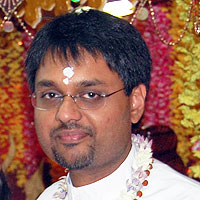 The Upanishads are the concluding portions of the Vedas, or Vedanta (the end of the Vedas). They represent both the concluding texts of the four principal Vedas and also the culmination of its teachings. The word “Upanishad” consists of three parts: Upa which mean “near”, Ni which means “down” and Shad which means “to sit”. Therefore the word “Upanishad” means “what was taught by making the disciple sit by the side of the teacher”. It also means that which takes one to the side of or near Brahman (Supreme Consciousness). Adi Shankaracharya also defined the Upanishads as the source of knowledge of Brahman whereby ignorance is destroyed.
The Upanishads are the concluding portions of the Vedas, or Vedanta (the end of the Vedas). They represent both the concluding texts of the four principal Vedas and also the culmination of its teachings. The word “Upanishad” consists of three parts: Upa which mean “near”, Ni which means “down” and Shad which means “to sit”. Therefore the word “Upanishad” means “what was taught by making the disciple sit by the side of the teacher”. It also means that which takes one to the side of or near Brahman (Supreme Consciousness). Adi Shankaracharya also defined the Upanishads as the source of knowledge of Brahman whereby ignorance is destroyed.
In total, there are 108 recognised Upanishads. Of these, some are recognised as being principal texts, including the Isha, Kena, Katha, Prasna, Mundaka, Madukya, Aitareya, Taittiriya, Chandyoga, Brihadaranyaka, Kaivalaya, Svetasvatara and Maitrayani Upanishads. The Upanishads are philosophical treatises that deal with the knowledge of Brahman (infinite consciousness), the Jiva or Atman (individual soul) and the relationship between both (they are one and the same). Other topics such as self realization, yoga, meditation, karma and reincarnation are all covered.
In the text of the Upanishads, there are great sayings referred to as the Mahavakyas of the Vedas. From each Veda, one Mahavakya each was selected by the sages that drive home the oneness between the individual soul and Brahman. These four Mahavakyas and their sources are as follows:
- Prajnanam Brahma – Consciousness is Brahman (Aitareya Upanishad of the Rig Veda)
- Ayam Atma Brahma – This Self (Atman) is Brahman (Mandukya Upanishad of the Atharva Veda)
- Tat Tvam Asi – Thou art That (Chandogya Upanishad of the Sama Veda)
- Aham Brahmasmi – I am Brahman (Brhadaranyaka Upanishad of the Yajur Veda)
Of the four Mahavakyas, “Tat Tvam Asi” is particularly powerful and instructive and it is worth contemplation and meditation. The Upanishads should be studied by every Hindu with adequate mental preparation. In conclusion, the following invocation at the start of the Isha Upanishad is usually recited as final offerings are made into the sacrificial fire. It is given with the translation below:
Om Purnamadah Purnamidam, Purnat Purnamudachyate
Purnasya Purnamadaya, Purnameva Vashishyate,
Om shanti, shanti, shanti
Om. That is the whole (complete, infinite, absolute reality); this is the whole; from the whole, the whole becomes manifest; taking away the whole from the whole, the whole remains.Om. Peace! Peace! Peace!


